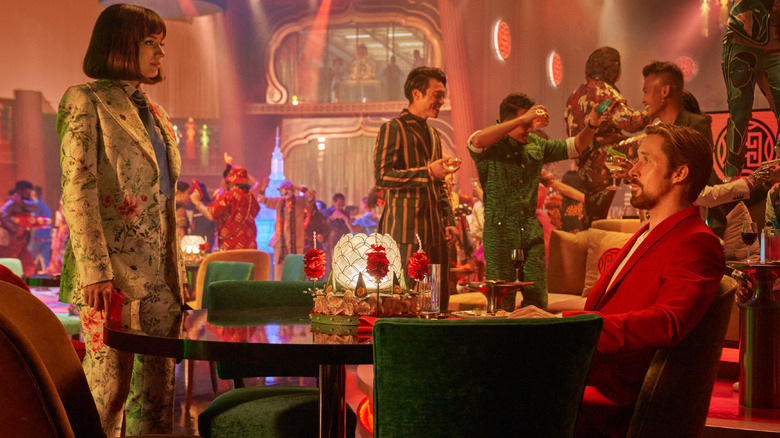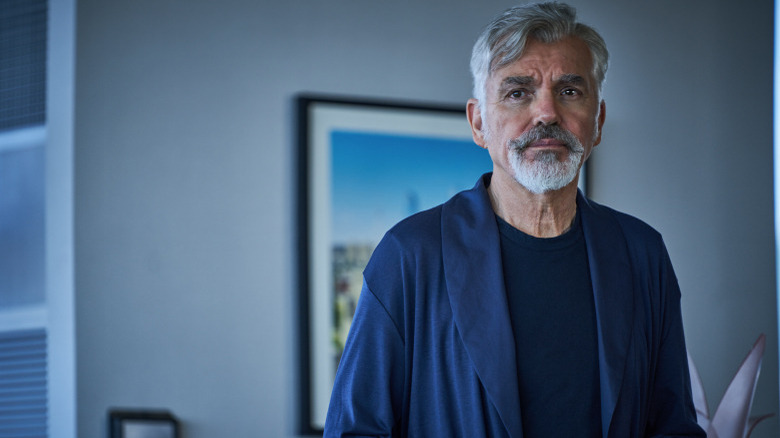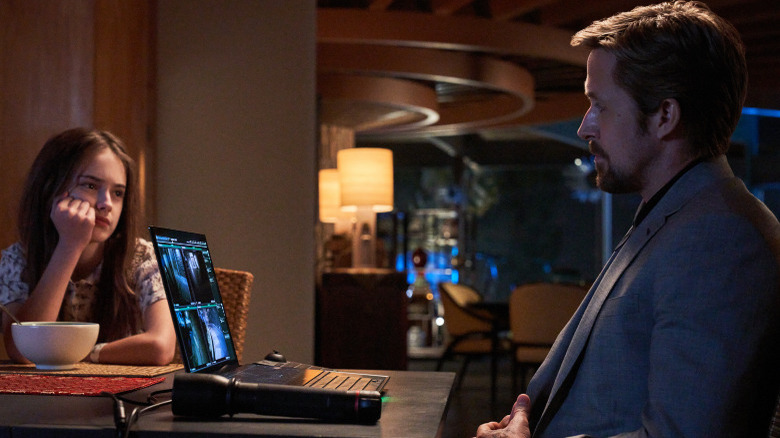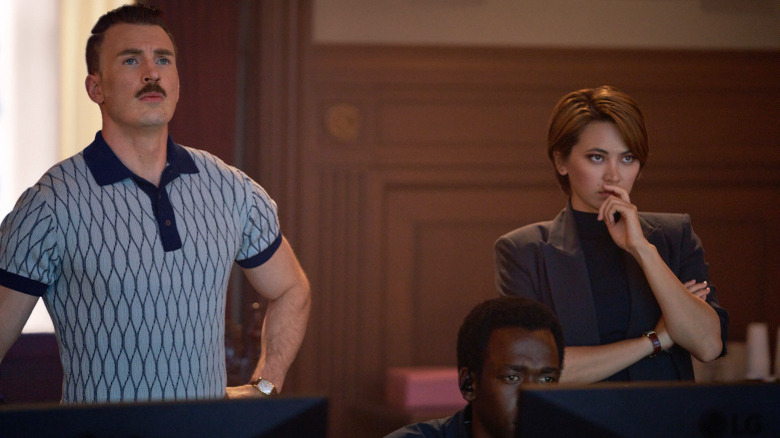The Gray Man Ending Explained: Just Another Thursday
Directors Anthony and Joe Russo's "The Gray Man" is a film that, at long last, answers the question: What if Jason Bourne liked to quip more?
Known for blending comedy with tragedy in their Marvel Cinematic Universe films and episodes of TV shows like "Community," it's no surprise the Russo Brothers would balance thrills with humor in "The Gray Man." The movie opens by introducing Ryan Gosling as Courtland Gentry, an incarcerated killer who is recruited by the CIA for the Sierra program. As the film later explains, Sierra is a black ops team comprised of convicts trained to act as assassins that the U.S. government can readily disavow, should a mission go south. In a shocking twist, it turns out the agency behind this scheme may be susceptible to corruption.
Most of "The Gray Man" finds Courtland, who goes by "Sierra Six" or just "Six," on the run after getting ahold of a drive that contains incriminating information about up-and-coming CIA official Denny Carmichael (Regé-Jean Page) and his dealings with a shadowy figure who, it's implied, is at least partly responsible for him rising up the ranks at the CIA. None of that really matters here, though. The mystery of Carmichael's benefactor is mostly sequel fodder, with the coveted drive serving as the film's MacGuffin.
No, the question "The Gray Man" focuses on answering is: What motivates someone like Six? The movie slowly sheds light on the issue through a series of oddly-placed flashbacks and reveals about Six's past. In the end, however, it all comes together to bring a little more depth to someone for whom killing bad guys and staring death in the face is "Just another Thursday" (as he puts it).
Bad fathers and sons
In its opening scene, "The Gray Man" shows Six being recruited in prison by Donald Fitzroy (Billy Bob Thornton), the seasoned CIA executive in charge of the Sierra program. The two are quick to establish a father-son dynamic. Fitzroy knows all about the crime Six committed and is sympathetic, telling him, "I would've done the same thing myself." He encourages Six to take his pain and "make it useful" by joining his unit but avoids sugar-coating the reality of the situation.
Six is quick to accept this deal, his attachment to Fitzroy a bit of a puzzle at first. As we later come to learn, though, Six's new stern-but-fair father-figure is a major upgrade from his biological father (Shea Whigham), an abusive man who tried to toughen up Six and his brother by making them burn themselves or holding their heads under-water in the bathtub, threatening to drown them. At one point, Six was faced with the choice of either killing his father or allowing him to kill his sibling. He chose the former, an act that cemented his — you know what's coming — gray attitude to morality.
When his mission in the present goes wrong, Six doesn't hesitate to contact a now-retired Fitzroy for help. To hunt Six down, Carmichael hires Lloyd Hansen (Chris Evans), a gleefully cruel, trash-stached former CIA agent turned mercenary who was somehow deemed too unscrupulous to work for the agency. Lloyd is the embodiment of what Six might've become, had he absorbed his father's toxic life-lessons and allowed his brother to die. He's the bad son to Six's good son, taking Fitzroy's niece Claire (Julia Butters) hostage in order to capture and torture Fitzroy for information on Six's location.
Lone Wolf and silver bird
What "Lone Wolf" like Six would be complete without a "Cub" at their side? It's Claire who fills this role in "The Gray Man," having lost her parents when she was younger. She also has a pacemaker, which makes her all the more vulnerable when Lloyd swoops in to kidnap her and ensure her uncle's cooperation with finding Six.
Once again, the movie fills us in on Claire and Six's relationship through a flashback. In the past, Six was called upon to guard Claire while Fitzroy was away. The latter is outgoing, loves to listen to Mark Lindsay's 1970 single "Silver Bird," and tells off Six for chewing gum in the house, so of course it's not long before her charms start to win him over. Six even saves Claire's life when her pacemaker briefly stops working, in the process becoming as much a surrogate father to her as Fitzroy is.
Yes, as much as Six is like Jason Bourne if he enjoyed cracking one-liners, he's also a lot like Dominic Toretto in that he's all about family. Where Bourne's journey sees him getting back in touch with his humanity and reckoning with the morality of his previous actions, "The Gray Man" skirts around this (to its detriment). Instead, Six is presented as an anti-hero who is primarily driven by concerns for specific people in his life, not any personal doubts about the morality of his previous life as a government-backed assassin.
Save it for the sequel
Everything comes to a head in the film's third act. By tracking the signal from Claire's pacemaker, Six and his CIA agent ally Dani Miranda (Ana de Armas) are able to determine where Lloyd is keeping her and Fitzroy prisoner. In the ensuing rescue attempt and shootout, Fitzroy is fatally wounded and blows himself up with a grenade, nearly taking out Lloyd with him. Elsewhere Dani is able to recover the drive from the enigmatic assassin (Indian cinema multi-hyphenate Dhanush) who stole it earlier in the movie, only to be left disillusioned by Lloyd's deplorable behavior.
While all that's going on, Six fights Lloyd one-on-one before the latter is killed by yet another corrupt CIA official, Suzanne Brewer (Jessica Henwick). Planning to blame everything on Lloyd in order to gain some leverage on Carmichael, Suzanne then wounds and blackmails Six into continuing to serve the CIA, to ensue Claire's safety. The resulting coverup seems to be going to plan, too, at least until Six breaks out of custody, rescues Claire (again), and sets off for destinations unknown.
"The Gray Man" thusly ends in a strange place where it feels like both a whole lot and very little has actually been resolved. The idea of Carmichael getting off scot-free is, sadly, not at all hard to buy, but the mystery of his benefactor is left completely open-ended. Nor, for that matter, are Six or Dani's personal arcs brought to a satisfying resting place. It's also unclear what either of them have even taken away from this whole experience, other than not to trust the CIA (which they already knew anyway).
Ultimately, if the Russo Brothers' movie resembles a $200 million pilot, it's because that's basically what it is. Just another Thursday at Netflix, you might say.



